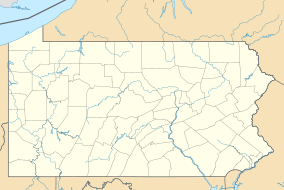Codorus State Park
| Codorus State Park | |
|---|---|
|
IUCN category V (protected landscape/seascape)
|
|

Lake Marburg and Codorus State Park in autumn
|
|
|
Location of Codorus State Park in Pennsylvania
|
|
| Location | York County |
| Nearest town | Hanover, Pennsylvania |
| Coordinates | 39°47′20″N 76°54′30″W / 39.78889°N 76.90833°WCoordinates: 39°47′20″N 76°54′30″W / 39.78889°N 76.90833°W |
| Area | 3,500 acres (14 km2) |
| Designated | December 1966 |
| Operator | Pennsylvania Department of Conservation and Natural Resources |
| Type | State Park |
| Opened | 1970 |
| Etymology | Nearby Codorus Creek |
| Status | Open all year |
| Camp sites | 193 sites (open April–November) [map] |
| Hiking trails | 4 trails, approx. 19 miles (31 km) total [map] |
| Website | Official website |
| Lake Marburg | |
|---|---|
| Codorus Lake | |
| Location | within Codorus State Park Spring Grove, Pennsylvania |
| Type | Artificial lake |
| Etymology | to former town of Marburg, PA, which lies beneath the lake |
| Primary inflows | Codorus Creek |
| Managing agency |
|
| Designation | IUCN category V (protected landscape/seascape) |
| Built | 1966 |
| First flooded | 1970 |
| Surface area | 1,275 acres (516 ha) |
| Max. depth | 110 ft (34 m) |
| Shore length1 | 26 mi (42 km) |
| Surface elevation | 622 ft (190 m) |
| Islands | 2 - Long Island, Round Island |
| Settlements | Hanover, Pennsylvania |
| 1 Shore length is not a well-defined measure. | |
Codorus State Park is a 3,500-acre (1,400 ha) Pennsylvania state park in Heidelberg, Manheim, Penn, and West Manheim Townships in southwestern York County, Pennsylvania in the United States. The park was created around Lake Marburg, an artificial lake covering 1,275 acres (516 ha), and is named for Codorus Creek, which forms the lake. Codorus State Park is located on Pennsylvania Route 216, 3 miles (4.8 km) from the borough of Hanover.
When Europeans first reached the land that became Codorus State Park, it was the territory of Susquehannock Indians, a powerful tribe that controlled much of the land near the Susquehanna River. Wars and the push of settlers, most of which were German farmers, led to the demise of the Susquehannocks, but industry soon followed.
Built in 1762, Mary Ann Furnace is believed to be the first charcoal furnace built on the western side of the Susquehanna River. The furnace supplied cannonballs and grapeshot for the continental army and employed Hessian prisoners to run the ironworks while many of the available workforce were off fighting the British. Nothing remains of the ironworks except memories.
The four original founders of Mary Ann Furnace had a great impact on the United States. George Stevenson emigrated from Ireland and was employed as a deputy surveyor by the Penn Family. Stevenson organized wagons and supplies for the Forbes Campaign during the French and Indian War. When the British occupied Philadelphia and York became the capital of the Colonies, George Washington called on Stevenson to take charge of the supply lines.
...
Wikipedia


